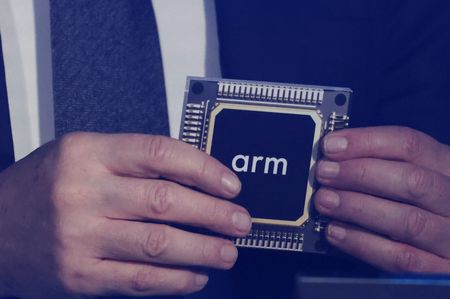By Max A. Cherney and Arsheeya Bajwa
(Reuters) -Arm Holdings shares tumbled 8% in extended trading on Wednesday, after the chip tech provider issued quarterly forecasts that disappointed investors, in part because of its plans to invest a portion of its profit into building its own chips and other components.
The company forecast fiscal second-quarter profit slightly below estimates as global trade tensions threaten to hit demand for Arm in its mainstay smartphone market, failing to satisfy investors who have sent the stock surging in recent months.
The plan to invest more heavily in developing its own chips marks a departure from Arm’s long-time business of supplying intellectual property to companies ranging from Nvidia to Amazon.com, which already design their own chips.
Finished chips are the “physical embodiment” of a product Arm already sells called Compute Sub Systems (CSS), Arm CEO Rene Haas said.
“We are consciously deciding to invest more heavily – (in) the possibility of going beyond (designs) and building something, building chiplets or even possible solutions,” Haas said in an interview with Reuters.
Chiplets are smaller, function-specific versions of a larger chip that designers can use as building blocks to form a complete processor. Solutions integrate hardware and software.
The decision to increase its investments in potential chips, chiplets and solutions may not result in a product if Arm decides to halt development or pause various projects, the company said.
If the company opts to make a full chip, it will eat into the company’s profit and is no guarantee of success. Advanced AI chips cost upwards of $500 million for the silicon alone and potentially more for the server hardware and software necessary to support it.
To build up the necessary staff to make chiplets and other finished chips, Arm has been recruiting from its customers and competing against them for deals.
Haas declined to provide a timeframe in which the company’s investments in the new strategy would translate into profit, or give specifics about potential new products that are part of the initiative. But he said that Arm would look at chiplets, “a physical chip, a board, a system, all of the above.”
For years, the SoftBank Group-owned Arm has embarked on an ambitious campaign to expand its revenue and boost its profit through a combination of new, higher-margin products such as the CSS tech and boosting the royalties it collects on each chip. Details of discussions among Arm executives about making its own chips emerged during a trial in December.
The decision to build its own chip could bring Arm into direct competition with its customers such as Nvidia, who rely on the company’s intellectual property.
INVESTORS DISAPPOINTED
Arm’s chip technology powers nearly every smartphone in the world, and its tame forecast underscores uncertainty faced by global manufacturers and their suppliers resulting from U.S. President Donald Trump’s tariff policies.
UK-based Arm forecast adjusted per-share profit between 29 cents and 37 cents for the fiscal second quarter, the midpoint of which is below analysts’ average estimate of 36 cents per share, according to LSEG data.
“Results and outlook were light and below expectations,” said Summit Insights analyst Kinngai Chan.
Arm has surged around 150% since its stock market debut in 2023, and its shares recently traded at over 80 times expected earnings, far higher than the PE valuations of Nvidia, Advanced Micro and other chipmakers focused on AI.
Smartphones remain Arm’s biggest stronghold. Morningstar analysts expect Arm to continue as the dominant architecture provider in smartphone processors, where it has a 99% market share.
Global trade tensions, however, cloud the outlook for the market.
Uncertainty fueled by tariff volatility and ongoing macroeconomic challenges has tapered end-market demand, with global smartphone shipments increasing just 1% in the April-to-June period, according to International Data Corporation.
Arm expects current-quarter revenue between $1.01 billion and $1.11 billion, in line with estimates of $1.06 billion.
The company reported first-quarter sales of $1.05 billion, coming in just shy of estimates of $1.06 billion. Adjusted profit of 35 cents per share was in line with estimates.
“Smartphone royalties (call it “Android on a low‑carb diet”) remain soft, especially in China, but cloud‑server and AI accelerator design wins keep the (next generation Arm tech) royalty treadmill humming,” Running Point Capital chief investment officer Michael Schulman said.
(Reporting by Max A. Cherney in San Francisco and Arsheeya Bajwa in Bengaluru; Editing by Alan Barona and Nia Williams)










